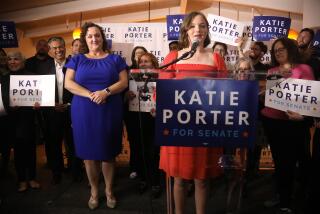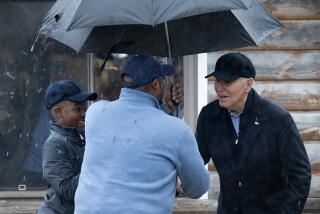Threatens Bids by Bush, Kemp in August Primary : Robertson Holds Limelight in Michigan
- Share via
LANSING, Mich. — When Michigan Republicans decided to make their state primary this August the first event in the campaign for the 1988 GOP presidential nomination, Vice President George Bush and New York Rep. Jack Kemp saw an early opportunity to advance their undeclared candidacies for the White House.
But as primary day nears, political newcomer Pat Robertson, a fundamentalist minister, is threatening to steal the glory that Bush and Kemp had hoped to gain. If the television evangelist can maintain his current momentum when Republicans go to the polls Aug. 5, he will assure himself and his conservative Christian supporters a conspicuous role in the selection of the 1988 Republican standard-bearer.
Only the First Step
The Aug. 5 vote, in which candidates from thousands of precincts around the state will seek election to be delegates to county conventions, marks only the first step in a multitiered process that will drag on until 1988, when the Michigan contingent to the Republican National Convention will finally be selected. And none of the delegates who will be chosen in August are legally bound to support any of the competing presidential contenders who have been campaigning in the state for months.
Still, the symbolic impact of a strong showing in the campaign’s first contest has not been lost on Robertson’s followers. “What we hope is that the message in Michigan will carry across the nation,” said Marlene Elwell, state coordinator of the Freedom Council, a tax-exempt organization founded by Robertson that has spent about $300,000 recruiting sympathetic candidates to run for slots as precinct delegates.
To deliver their message, however, Robertson’s backers will have to overcome stiffened opposition from supporters of Kemp and Bush--and perhaps fend off criticism of the nominally nonpartisan Freedom Council’s political activities.
Brooks Patterson, Bush’s top gun in Michigan, said: “The proof of the pudding will come on Aug. 5.”
As for the Kemp forces, strategist John Maxwell grumbled that the support Kemp has lined up in Michigan had been overshadowed by all the media attention Robertson had drawn. “We’ve had a tremendous organizational success but a public relations disaster,” he said, indicating the importance of perceptions at this early stage of campaigning.
Confusion Over Loyalties
The absence of any clear connection between the delegate candidates on the ballot and the competing presidential prospects has led to confusion. Sifting through reports from clerks in Michigan’s 83 counties, state Chairman E. Spencer Abraham estimated that about 10,000 people have filed to run as delegate candidates. However, Bush and Robertson backers claim to have recruited about 5,000 candidates each, while Kemp’s supporters assert they have sponsored more than 3,000, for a total of 13,000 candidates--or 3,000 more than the total.
“The problem is they are each counting some of the same people,” Abraham said. “I think it’s impossible to project who did what.”
Despite the fog of figures, even Robertson’s foes grudgingly concede that, by the gossamer axioms of presidential politics, the television preacher is ahead simply because his performance in recruiting candidates exceeded expectations.
“Robertson did far better than we thought he would do,” said Maxwell of the Kemp staff.
Working through a network of churches scattered around the state, the Freedom Council recruited delegates in areas of the state largely neglected by the established politicians backing Kemp and Bush.
Inspired by Dissatisfaction
“Bush and Kemp concentrated in the more populous places,” said Richard Minard, the council’s top political strategist. “We filed delegates in every congressional district.”
The citizens who flocked to the Freedom Council’s banner were inspired more by a general dissatisfaction with the way government touched their everyday lives than with enthusiasm for a Robertson presidential candidacy, according to state coordinator Elwell. “The average person we found was very unhappy with the educational system, what their kids are coming home with from school, the values they’re being taught,” she said.
A state coordinator for the 1984 Reagan campaign, Elwell used her well-honed professional organizing techniques to tap the amateur moral fervor at Michigan’s grass roots.
“The average American who believes in traditional family values has been very frustrated because they did not feel there was a way to change things they have been unhappy about,” she said. “The average person we spoke to didn’t know anything about precinct delegates. They were under the impression that to be involved in politics you need a certain kind of education, you had to know a certain person.”
‘You Can Make a Difference’
What the Freedom Council’s recruits to politics learned, she said, is that “you can make a difference. If you don’t like what your children are bringing home from the school, it’s time to stop complaining and become part of the system and know who you’re electing to the school board.”
Howard Phillips, head of the Conservative Caucus, a national grass-roots lobbying organization, called Robertson “the big winner” so far in Michigan, but added: “Clearly, the bloom would be off the rose if he doesn’t come in first on Aug. 5.”
Beyond that, all the attention focused on Michigan could make Robertson vulnerable to criticism about the propriety of the Freedom Council’s role in the campaign. Although Robertson is no longer directly connected to the council--whose tax-exempt privileges depend on its nonpartisan status--council leaders concede that he stands to benefit from its efforts to encourage Christian conservatives to participate in political activity.
Publicity May Be a Problem
Elsewhere in the Christian Right, the Freedom Council’s spurt of publicity is seen as a potential problem. “We’re worried that Pat, by using his foundation as a political vehicle, is pushing the law to the edge,” said an official of another tax-exempt organization who asked not to be identified.
“If I were a critic or a foe of Robertson, I’d sure as hell make the political activity of the Freedom Council an issue,” added Stuart Rothenberg, a political analyst for the conservatively oriented Institute of Government and Politics and author of “The Evangelical Voter.”
Robertson’s chief political rivals are not likely to level the same kind of criticism. Both Bush and Kemp are concerned about maintaining their own status as non-candidates under the law, lest the funds spent on their behalf in Michigan be charged against the campaign spending limits that will govern them when they do become declared presidential candidates.
Bush, Kemp Use Committees
Instead of using a tax-exempt foundation like the Freedom Council, Michigan supporters of Bush and Kemp are relying on political action committees that are ostensibly concerned with party building and helping other Republican candidates.
Because there is no way of firmly establishing which presidential prospect each delegate candidate chosen Aug. 5 is backing, the hardest problem facing Robertson and his rivals in Michigan may be establishing who the real winner is.
To clarify matters, party Chairman Abraham suggested that the rival camps could issue lists of the delegate candidates they are supporting. However, the competitors are unenthusiastic about the proposal.
“You’re not going to get any of the candidates to do that,” contended an adviser to one of them. “It would be giving away too much information to the opposition.”
More to Read
Get the L.A. Times Politics newsletter
Deeply reported insights into legislation, politics and policy from Sacramento, Washington and beyond. In your inbox twice per week.
You may occasionally receive promotional content from the Los Angeles Times.










